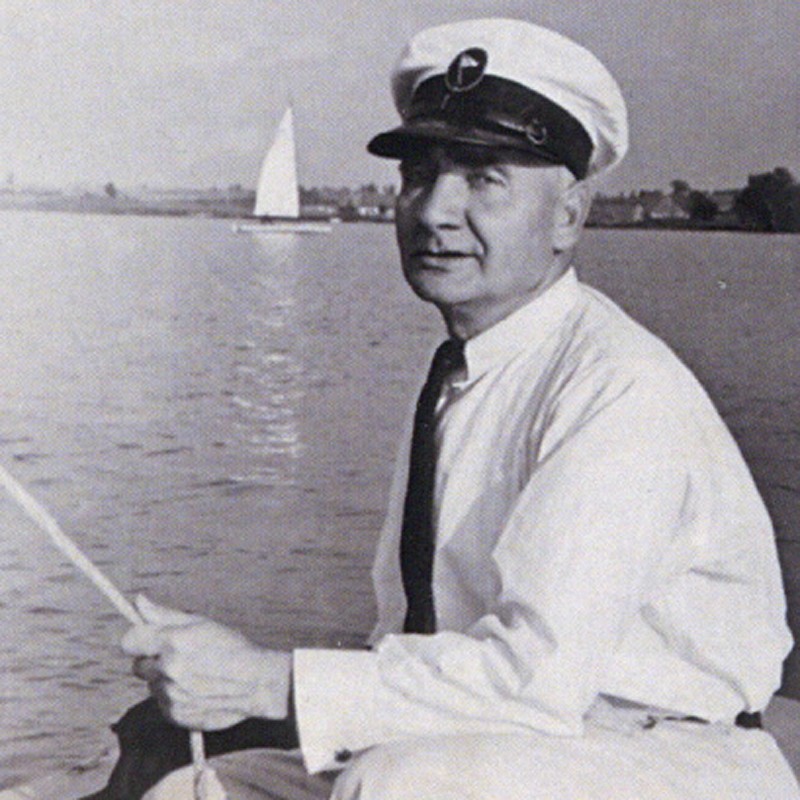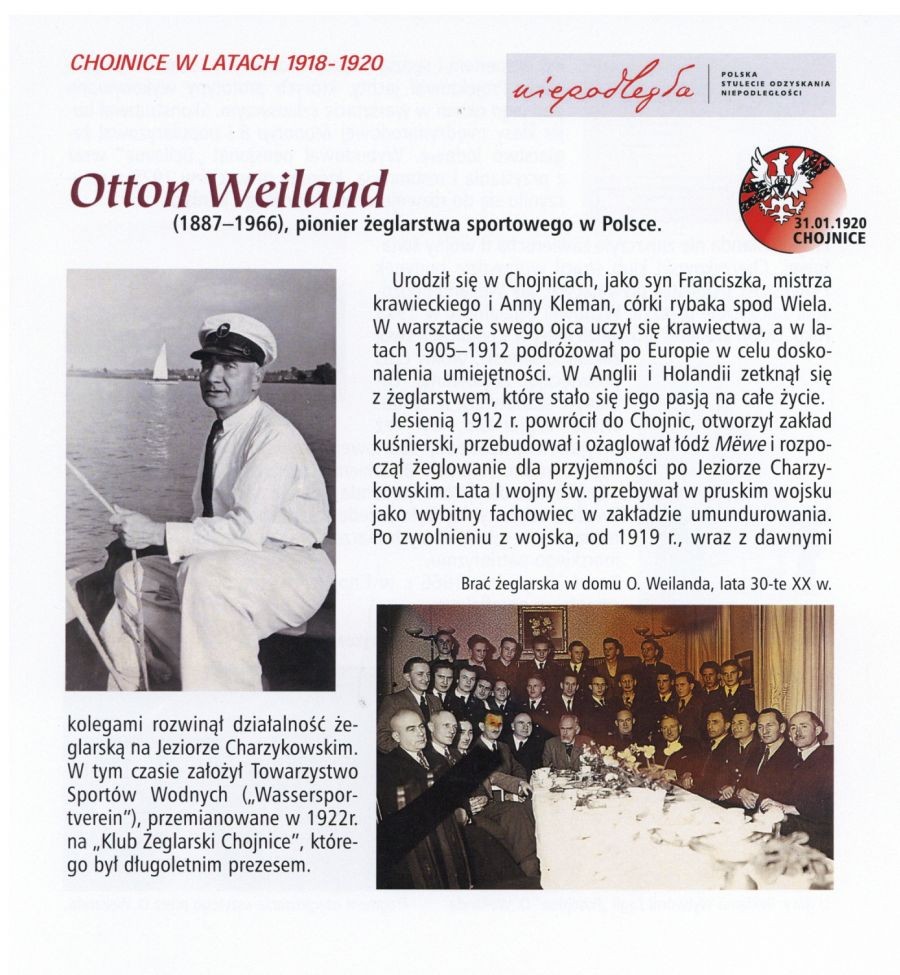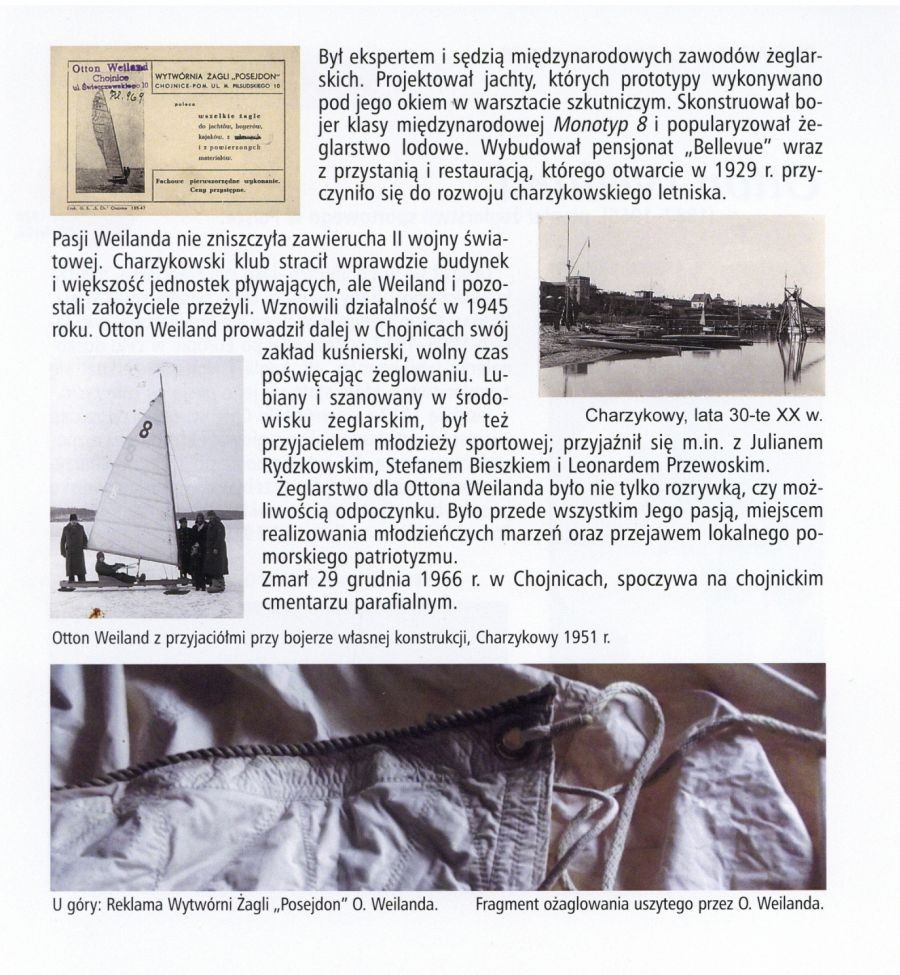
Otton Weiland (1887-1966), pioneer of sports sailing in Poland
It is impossible to imagine the centre of sport and tourism in Charzyki without the participation of Otto Weiland. It is to him that we owe the birth and development of sports sailing in Poland. He treated his passion not only as a pastime, but as a manifestation of local patriotism.
Otton Weiland was born into a middle-class family on 2 October 1887 in Chojnice. His father, Franciszek Weiland, worked as a master tailor and his mother, Anna Kleman, was the daughter of a fisherman from near Viel. Otton attended a four-grade folk school for boys. He then learned tailoring under his father's tutelage and passed his journeyman's exam in 1904. He wanted to gain more knowledge about the craft and for this reason he travelled abroad. During his nine years there, he visited Germany, the Netherlands and England, studying under renowned masters in these countries. Otto Weiland's special interest was furriers. In England and the Netherlands he came into contact with sailing, which became his greatest passion.
In 1912, he returned to Chojnice and bought a tenement house at what was then 10 Dworcowa Street (now 10 Piłsudskiego Street). Then, together with his brother Oskar, he opened a tailoring and furrier's shop. With his own hands, he converted his fishing boat into a rowing and sailing boat. When he launched his boat on Lake Lukoma, he aroused a lot of curiosity among the citizens of Chojnice, as his sailing boat was the first on the Charzykow reservoir.
After the outbreak of the First World War, Otton Weiland was called up into the Prussian army. He was an excellent professional and was employed at a factory sewing military uniforms in Gdansk. In his spare time, he pursued his passion by sailing on a jolly, purchased there and moored on the banks of the Motlawa River.
After his discharge from the army in 1919, he and his friends developed sailing activities on Lake Charzykowy. At that time, he founded the Water Sports Association under the name ‘Wassersportfreunde’ (most of its members were of German nationality). Thanks to his enormous passion and great commitment, Otton Weiland won over more and more supporters. He then purchased a sailing boat from a builder in Berlin, which he named ‘Rausch’ (Intoxication). On 25 July 1920, the first regatta took place on Lake Charzykowskie, with four boats competing.
On 17 March 1922, the Water Sports Association was transformed into the Chojnice Sailing Club with its headquarters in Charzyki. A 15-member board of directors was then elected, with Otton Weiland as president. Not much later, similar clubs of amateur yachtsmen began to emerge in the country, whose representatives came to an agreement and in May 1924, in Tczew, formed the Polish Yachting Association (Weiland was elected vice-president of the PZŻ).
There was a growing interest in water sports among the Chojnice community. For this reason, Otton Weiland built the ‘Bellevue’ guest house with a marina and restaurant in 1929, which contributed to the development of the Chojnice summer resort. A great honour in recognition was the visit of a group of sportsmen and activists from our region headed by Weiland to President Ignacy Moscicki at the Royal Castle in Warsaw on 18 January 1931.
Otton Weiland was probably the originator of the all-yacht regatta for the Blue Ribbon of Charzykowskie Lake. They took place for the first time on September 11, 1932, on the route from Małe Swornychgaci to the marina in Charzyki. The tradition of this annual regatta, the oldest sailing tourist event in Poland, continues to this day. Ice sailing also developed under the patronage of the president of the Chojnice Sailing Club. From the early 1920s Weiland built the slips himself according to his own idea. From 1934 onwards, the Monotype XV class buoys began to be built. At that time, the club's management applied to join the European Union of Ice Yachting. This was achieved a year later and Otton Weiland became the PZZ delegate to the EUJL. In January 1935, a boating regatta was held on Lake Charzykowskie to determine the champion of Poland. Due to storm damage to half of the slips, the competition was interrupted.
As an expert and international judge, Otton Weiland enjoyed recognition for his outstanding achievements. He also became a member of the PZŻ-approved examination committee for the rank of yacht helmsman. At the beginning of 1935, his consecutive term as club president came to an end. Weiland's successor in this position was the then mayor of Chojnice, Zdzisław Hanula. When the Nazi occupation began, Otton Weiland refused to sign the German nationality list. He felt himself to be a Pole and despite the pressure and numerous harassments his patriotic attitude remained unchanged. The Charzykowski club then lost its building and most of its vessels. After the end of the Second World War in 1945. Weiland regained his guesthouse, restaurant and sailing marina. Although he was no longer part of the top management, he still remained on the club's board. With his many years of experience and vast knowledge, he became a model sportsman and sailor for the next generations. After the dissolution of the KŻCh in 1950, for political reasons, Otton Weiland became a member of the sailing section of KS ‘Chojniczanka’. From then on he sailed only as a tourist.
Chojnicka Wytwórnia Sprzętu Sportowego ,,Polsport’ used Weiland's boatbuilding expertise. Between 1950 and 1955, the plant produced ice slips of the ‘Monotype XV’ and ‘People's’ classes of his design . Despite his advanced age, Otton Weiland continued to run the furrier's workshop and the sailmaking plant. On 9 December 1956, he was the seventh person in Poland to be awarded the gold badge of Meritorious Service to Polish Sailing.
After the ‘socialisation’ by the communal cooperative ‘Samopomoc Chłopska’, the ‘Bellevue’ hotel and restaurant in 1948, two rooms were left for Weiland to use. He lived there from spring to autumn together with his sister. He continued to own the plot of land, on which he built a glass-enclosed gazebo with 50 seats for guests in 1956. He also owned a marina with a small house and a cabin yacht , the ‘Rose’. The young people appreciated Otto Weiland's authority, skill and kindness and gladly gathered around him. There was no shortage of friends around him either, such as Stefan Bieszk, Julian Rydzkowski and Leonard Przewoski.
Otton Weiland was married to Róża Jażdżewska (1885 - 1943), who came from Zalesie near Brus. The couple did not live to see any children. After the death of his wife, Otton Weiland remained single and lived and farmed together with his sister. He died on 29 December 1966 in Chojnice and was buried two days later in the Chojnice parish cemetery next to his wife Rosa.

